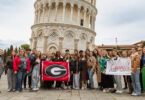Athens, Ga. – The just-released Winter 2012 issue of The Georgia Review, the University of Georgia’s internationally recognized quarterly journal of arts and letters, is a literary tour that touches down on three continents and in a half-dozen centuries.
From politically tinged essays by two Pulitzer Prize-winning poets to a frighteningly beautiful piece of fiction set in the immediate aftermath of 9/11 to the tale of a lunatic evangelical grandmother in South Carolina, this issue also marks the completion of the Review’s first full year of providing online subscriptions to complement its perennial (since 1947) print version; either is available for $35 per year, and a combo subscription is $45.
Controversial South African sculptor Jane Alexander graces the issue’s wraparound cover and interior portfolio with a range of her provocative “humanimals” in their emotionally charged 3-D settings-all rendered from an array of media and materials that includes ceramic, fiberglass, paint, clothing, jewelry, razor wire, courtroom furniture and much more.
Maxine Kumin, a Pulitzer Prize-winning grand dame of American poetry, offers the incisive “Metamorphosis: From Light Verse to the Poetry of Witness,” wherein she outlines the evolution of her seven-decades-long writing career-one that has come around to focusing on political, social and ethical issues, but that began with such mass-market, “ladies’ mag” jingles as this: “There never blows so red the rose, / So sound the round tomato / As March’s catalogues disclose / And yearly I fall prey to.”
Stephen Dunn, also a Pulitzer winner, takes to task a number of other poets-and, along the way, a filmmaker and artists in general-for their tendency to simplify complex matters and to forget the hard-earned value of making sense to their audiences. His essay, “Poetry Now, and Some Thoughts on History, As If, Maybe, and No,” is complemented by Paul Zimmer’s “Reliquaries,” whose quirky survey of sacred containers takes the reader to a “tooled golden frame” in the Holy Cross Chapel of Prague, but also to a buried glass canning jar beside a Canton, Ohio, garage wherein the child Zimmer preserved his first-ever pet-a dime-store turtle he had named Murgatroyd.
Internationally renowned poet and Rumi translator Coleman Barks, who resides in the same city as The Georgia Review (Athens), contributes a long, sweeping poem about writing, reading and speaking in the aftermath of the stroke he suffered in early 2011. Brian Simoneau, a relative newcomer of a poet, studies his young daughter studying John Singleton Copley’s painting “Watson and the Shark.” David Roderick’s “After de Tocqueville” rereads America in the tea leaves of Democracy in America, and Richard Bernstein-himself a high-school teacher-takes his readout, “No Sermons in Stone,” from the relative absurdity of a statewide educational luncheon: “What is it, after all, that the future would have us believe? / That with enough bad coffee and a little training, / high-stakes testing will be our bar graph to the stars?”
Readers will find much more of broad interest in the issue as well, including fiction-based reminders that the world still faces an AIDS crisis (“Griffonia” by Rene Houtrides) and religion-based bigotry (“Rapture” by 2012 Rona Jaffe Award winner Julia Elliott).







